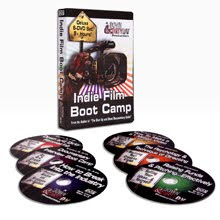A few weeks back I attended a packed-house lecture that Arun gave on the Obama campaign's media strategy at NYU. It was sponsored by FrogDesign and Fast Company Magazine (a read I highly recommended for entrepreneurial types). Arun showed a bunch of video clips from the Obama media campaign which I thought were quite cutting edge for politics- generally, very candid, humorous, revealing and even a few edgy spots and clips the campaign has put online. But most of all, they really seemed fresh and smart- not at all like the traditional political spots we're used to.
A Few Minutes w/ Arun Chaudhary,
Barack Obama's Director of Field Production
As Director of Field Production, Arun generally produces, edits, and sometimes shoots his own political spots, most of which are turned around in days and hours, not weeks. (There are several such teams of Producer/Camera producing spots independently, but all under a unified central media strategy.) So, by my calculations and for all practical purposes, Barack Obama has a straight up Down and Dirty video team.
I long ago gave up arguing and frothing at the mouth over the sickening ebb and flow of this non-sensical, divisive, blue vs. red, devolved state of American politics. (My senitiments on public political discourse online can be summed up by Jay-Z's line "Don't argue with fools...from a distance people can't tell who's who".) However, as a media maker, I still remain completely fascinated at the sheer effectiveness of the use of video media - the good, the bad, and the ugly - in modern American politics.
I'm not talking about the politics themselves or the right or wrongness of it, but I'm simply fascinated by watching how campaigns and all of our political entities craft and execute media campaigns- (even the misleading ones) to sway the opinion of a precinct, nation, or even world. I'm captivated by the game itself, rather than the players, if that makes sense.
While the politics have become a major turn off for me in recent years, the political media game remains facinating to me. It's the ultimate tv programming battle...coming up with effective attention-grabbing video projects, on a break-neck turnaround, on tight budgets, that are ultimately intended to play a major role in directly swaying the very course of history. (Witness the Paris Hilton/John McCain campaign ad battle I put up in my last post.) These aren't little commercials to sell cars or dog food...This is as real as media influence gets, because the stakes are no less than the leadership of the free world. (And that's not just hyperbole- that's some "realperbole".)
The times have changed. If anyone wants to be a viable candidate for a high public office, they really do need to build an organization that understands how to effectively use media to define their candidate, get their message out, defend against attacks, and when necesary attack back. Finding the fine line between humorous and offensive, candid and unwise, spirited defense and smear is not an easy business fo anyone. To date, I think the Obama campaign has played the media branding game as good as any candidate in recent times. (See Fast Company article on The Brand Called Obama)
And the fascinating thing about it all to me that I think alot of people miss, is that more and more in this age of instant and accesible on-demand video, the world is being swayed one way or another by nothing more than basic filmmaking storytelling techniques...the type of music, tinting footage, slowing down a shot, intentionally showing a "character" in flattering or unflattering lighting, juxtaposition editing, editing out of context, low angles, high angles, zooms in, zooms out, color correction... all very carefully crafted to sway public opinion, for better or worse (and I definitely think better in Arun's case), by everyday ordinary filmmakers - like us.
To me personally, these political seasons just serve as a reminder of the incredible power we hold- literally in the palm of our hands - when we know how to successfully execute our craft to tell stories that move people. (The electorate is just another type of audience.) If we are responsible with it and apply those very same story-telling techniques in the right directions- it stands to do just as much good as harm in our world...that's the real power in our hands as the media makers of the world.
Whether it's as big as presidential politics or a short doc on a battered woman's shelter. Through the application of our filmmaking craft, we alone are in uniquely powerful position to literally change the world - one visual story, one person at a time, in so many tangible and untangible, but very real ways.
Like I said in the book...if not us, then who? Look around you. We're it, Baby! You think the world is f#@ked up? Wanna change it?
Do what Arun did- grab a camera and Shut Up and Shoot.









No comments:
Post a Comment